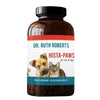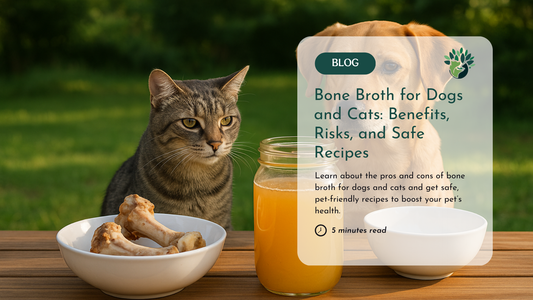Vaccinations can be a hot-button topic, especially in light of recent global health debates. But when it comes to your dog’s health, it’s important to separate fact from fiction. After nearly 30 years in veterinary medicine, I've seen firsthand the life-saving power, and occasional pitfalls, of vaccines. So let’s break it down.
Why Core Vaccines Still Matter 💉
Vaccines like those for parvovirus and distemper have saved millions of dogs. I’m old enough to remember entire towns of dogs dying from parvo in the late '70s and '80s. It was devastating, and completely preventable today.
Here’s a quick look at core vaccines recommended by the American Veterinary Medical Association (AVMA) and American Animal Hospital Association (AAHA):
Rabies Vaccine – Protects Against Rabies Virus
-
What Rabies Virus does: A deadly neurological disease transmitted through bites. Zoonotic, can infect humans.
-
Legal requirement: In most places, vaccination is legally mandated.
-
Note: The Rabies Challenge Study demonstrated that dogs vaccinated against rabies remained protected for at least 5-7 years, even if their antibody titers (a measure of immune response) decreased over time, according to the Connecticut General Assembly. This means that revaccination after this period may not provide any additional benefit and could potentially carry some risk. Some health departments now accept titer results instead of requiring another booster.
Parvo Vaccine – Protects Against Canine Parvovirus
-
What Parvovirus does: Causes severe gastrointestinal illness (vomiting, bloody diarrhea) and in some cases heart disease in young pups.
-
Severity: Extremely high mortality rate, especially without supportive care.
-
Note: In the 70s and 80s, entire towns of dogs were wiped out. It’s still common today but easily preventable with the vaccine.
-
Treatment: Symptomatic support like fluids; some antiviral meds may help.
Distemper Vaccine – Protects Against Canine Distemper Virus
-
What Distemper Virus does: Affects the central nervous system (brain and spinal cord), causing seizures, tremors, and often death.
-
Severity: ~85% fatality rate in infected dogs.
-
Note: Very rare today thanks to vaccines, but still devastating when it occurs. Puppies without protection are at highest risk.
These protect against serious, often fatal diseases. While some of these conditions are now rare thanks to vaccines, they can still pop up, especially in unvaccinated puppies.
Non-Core Vaccines
These vaccine are only recommended based on lifestyle and location:
-
Leptospirosis – A tricky bacterial infection affecting kidneys and liver. The challenge? The vaccine doesn’t always match the strains found in your environment.
-
Bordetella (Kennel Cough) – Important for dogs that visit boarding facilities, groomers, or dog parks.
-
Lyme Disease – Worth discussing if you live in a tick-heavy area.
-
Rattlesnake & Canine Coronavirus Vaccines – Generally not recommended.
Non-core vaccines should only be given if your dog’s lifestyle or environment puts them at risk. Typically, they are administered at 12 weeks of age or older, especially if your dog is considered high-risk due to exposure to other animals, travel, or outdoor activities.
Core Vaccines Timing Recommendations
Core vaccines are essential for all dogs, and the schedule is designed to provide immunity once maternal antibodies have waned enough for the vaccine to be effective.
Distemper and Parvovirus (Combination Vaccine)
- First Dose: After 12 weeks of age. This is when maternal antibodies typically drop low enough for the puppy to respond to the vaccine.
- Second Dose: At 16 weeks of age to ensure full immunity.
- Booster: At 1 year of age (or 12 months after the last puppy vaccine).
- Afterward: Use titer testing every 3 years to check immunity instead of automatically revaccinating
Rabies
- First Dose: At 14 to 16 weeks of age, depending on local laws.
- Booster: At 1 year of age (or 12 months after the first dose).
- Afterward: Rabies vaccines are typically required every 3 years, but titer testing may be an option in some areas to confirm immunity
Core Protection, Not Over-vaccination
Timing Matters
The key is to wait until maternal antibodies have dropped low enough for the vaccines to be safe and effective. Vaccinating too early, before 12 weeks, can result in a poor immune response, as the maternal antibodies interfere with the vaccine’s ability to stimulate immunity.
Titer Testing Over Routine Boosters
One of the most important aspects of vaccination philosophy is the use of titer testing to determine whether a dog still has immunity from previous vaccinations. This approach minimizes unnecessary vaccinations and reduces the risk of adverse reactions. For core vaccines like distemper and parvovirus, titers are a reliable indicator of immunity
Minimal Vaccination Philosophy
I advocate for a “less is more” approach to vaccination. While vaccines are essential, over-vaccination can lead to immune system dysfunction, including autoimmune diseases. By focusing on core vaccines and using titers to guide decisions, we can strike a balance between protection and safety
|
🎥 Want to create a safe and tailored vaccination for your pet? Watch my video: Pet Vaccines 101 – How to Create a Safe and Tailored Vaccination Plan for Your Pet! You'll learn how to assess your pet’s individual risk, understand local disease threats, and make smart, personalized choices—without compromising their health. |
Supportive Care During Vaccination
To reduce the risk of vaccine reactions, I recommend supporting your dog’s immune system before and after vaccination. This can include:
- Thuja: A natural remedy to detoxify the body post-vaccination.
- Milk Thistle: To support liver health, especially if your dog is receiving multiple vaccines or medications.
- Probiotics: To maintain gut health, which is closely linked to immune function.
Lifestyle-Based Decisions
Vaccination schedules should be tailored to the individual dog. For example, a dog that stays at home and has minimal exposure to other animals may not need non-core vaccines like parainfluenza or leptospirosis. Conversely, a highly social dog may benefit from additional protection
Managing Dog Vaccine Side Effects
While vaccines are crucial for protecting your dog’s health, it’s important to be aware of potential side effects. Mild reactions like soreness at the injection site or a slight fever are common. However, if your dog experiences more severe symptoms such as vomiting, diarrhea, or difficulty breathing, contact your veterinarian immediately. In some cases, titer testing can be used to determine if your dog still has immunity from previous vaccinations, potentially reducing the need for frequent boosters.
To further support your dog's health during vaccination and heartworm prevention, consider following our Vaccine & Heartworm Support Protocol. This protocol offers natural solutions to minimize potential side effects and promote overall well-being.
|
👉 Want to learn more about core vs. non-core vaccines and how to make the best choices for your dog? 🎥 Watch Dr. Ruth Roberts' YouTube video here for a deep dive into vaccine timing, lifestyle-based decisions, and how to avoid over-vaccination. 🎙️ Listen to Dr. Ruth Roberts on Dr. Stephanie Gray's podcast Your Longevity Blueprint talking about Core and Non-core Vaccine and Flea, Tick and Heartworm Prevention. |















